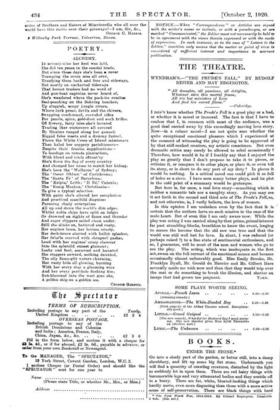THE THEATRE.
WYNDHAM'S.—" THE PRUDE'S FALL" BY RUDOLF BESIER AND MAY EDGLNGTON.
"All thoughts, all passions, all delights, Whatever stirs this mortal frame, All are but ministers of Love And feed his sacred flame." —Coleridge.
I DON'T know whether The Prude's Fall is a good play or a bad, or whether it is moral or immoral. The fact is that I have to confess that I, in common with most of the audience, was a good deal carried away by this exceedingly moving love story. Now—in a calmer mood—I am not quite sure whether the quite exceptional emotional pleasure which I experienced at the moment of witnessing the play is going to be approved of by that stiff-necked creature, my artistic conscience. But even dramatic critics may surely be allowed to rebel occasionally ? Therefore, how would it be if I frankly say that I enjoyed the play so greatly that I don't propose to take it to pieces, or criticize it, or compare it to other plays, or place it, or. even tell its story, or in short to do any part of my duty ? In pieces it would he nothing. In a critical mood one could pick it as full of holes as a sieve. I have seen many better plays, and its plot in the cold print of a summary would be grotesque.
But here is, for once, a real love story—something which is neither a romantic tale nor a naughty story. As you may see it set forth in the second and third acts of The Prude's Fall, so, and not otherwise, is, I verily believe, the love of women.
In this opinion I am unshaken even by the fact that it is certain that the authors have no such mission in the case of the male heart. But of even this I am only aware now. While the play was acting I was carried along by that prime, primal interest far past stumbling-blocks, breathless to know the event, longing to assure the heroine that the old saw was true and that the world was still well lost for love. In short, I was reduced (or perhaps raised ?) to a fine state of sentimental enthusiasm, and so, I guarantee, will be most of the men and women who go to see the play. The acting, which was inadequate in the first act, swam on the full current of the emotional scenes and became occasionally almost unbearably good. Mies Emily Brooke, Mr. Franklyn Dyall, Mr. Gerald du Manlier and Mr. Gilbert Hare severally made me wish now and then that they would trip over the mat or do something to break the illusion, and shatter an image that had grown too poignant. TARN.


































 Previous page
Previous page